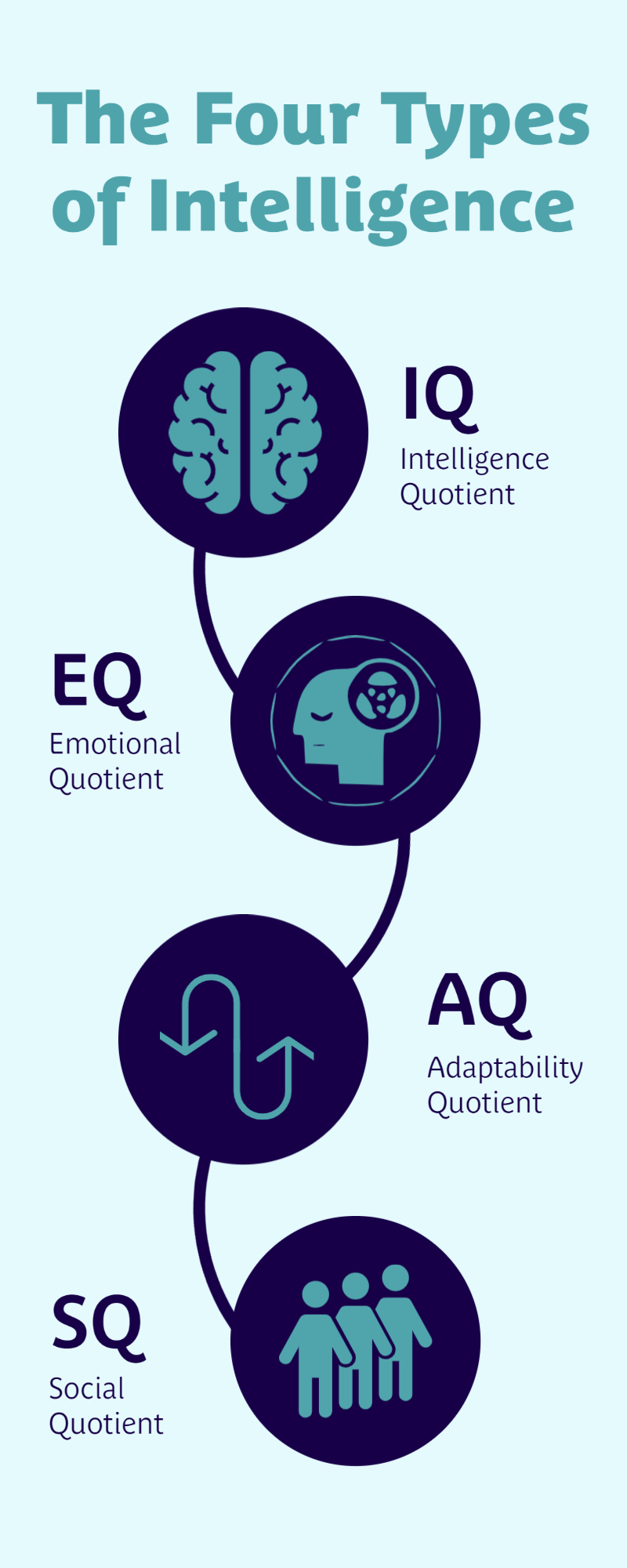Most of us are familiar with the use of cognitive intelligence (IQ) and emotional intelligence (EQ) as measures of aptitude and projected performance in the workplace.
However, there’s a new ‘Q’ that’s rapidly growing traction, as the true test of success in today’s modern workplace. And it’s called ‘AQ’ or adaptability quotient.
American business magazine Inc. provides a simplistic definition of the three Q’s.
IQ or Intelligence Quotient: The intelligence, knowledge, facts and trivia that one possesses.
EQ or Emotional Quotient: The emotional understanding and capability of oneself and others that helps with differing situations and people.
AQ or Adaptability Quotient: The ability to adapt to and thrive in an environment of change.
As a side note, SQ or Social Quotient also loosely fits into the ‘types’ of intelligence. SQ is a measure of a persons ability to build a network of friends and maintain it over a long period of time.
There is a correlation between the four types of intelligence and in some instances a trade-off depending on your particular character or ability. For example, a person with an extremely high IQ will often have a low EQ and SQ. Interestingly, it appears that those with a higher EQ and SQ have a tendency to go farther in life.

So why is AQ growing in popularity?
Our world is changing, especially technology which is moving at an exponential rate. In the workplace, it requires us to learn and adapt faster than we have ever had to before. And that’s why some are saying that our adaptability quotient will soon become the primary indicator of success.
This is great news for those of us born with more potential to adapt. But what’s really interesting is that every one of us can get better at this over time.
So how can we increase our AQ?
As Inc. magazine describes, the ability to adapt starts with taking accountability of a situation for the necessary and needed changes.
There are many models that help people to achieve this, for example ‘See It, Own It, Solve It and Do It’.
See It – acknowledge change is needed.
Own It – take ownership of the situation.
Solve It – develop your action plan.
Do It – execute the change.
There’s no denying that the future is fast approaching and we will all need to adapt to it. Within time, we will agree that adaptability is an important indicator of future success and will start to see it used as a metric in executive recruitment, particularly around ‘fit’ for an organisation. This includes looking for new ways to test our AQ and improve it over time.
Our experiences of the past few years responding to the impacts of a global pandemic are proof enough of the value of having a high AQ.
As a starter, to increase your AQ, take accountability and help your organisation not only deal with change but help them become champions of change.
How can you hire for AQ?
A robust recruitment process will include a range of assessment and selection methods to ensure you are making the right hiring decisions. And this includes looking beyond ‘hard’ skills – specific knowledge or abilities needed to do a job – to also consider a candidate’s ‘soft’ skills like communication, empathy and critical thinking.
Employers are increasingly looking for talent who have high IQ, EQ and AQ – people who can do the job and also connect with others and have the right mindset, drive and motivation. AQ in particular, is highly sort after when recruiting new members for a high-performing team or organisation.
Remember that in a lot of roles, skills can be taught. AQ or resilience however is part of a person’s character.
So, what to look for during the hiring process:
- Candidates who model adaptability, particularly important for people leaders (look for open mindedness and a curious mindset).
- Does the candidate have skills outside of their area of expertise (i.e., fluent in multiple languages, active volunteer)? This could point to a person who is able to adapt and respond comfortably in new situations.
- Include AQ as a specific ‘test’ as part of behavioural and psychometric assessments.
- Develop a set of questions for candidate interviews that gives you insight into how they reacted or approached a situation of intense change. Were they comfortable answering the question/s and did they navigate the situation well.
Need help?
If you are looking for direction and assistance on unearthing and retaining the right talent for your business, get in touch with us. We’d love to chat.
The Decipher Team
To stay on top of current recruitment trends and technologies follow Decipher Group on LinkedIn.










